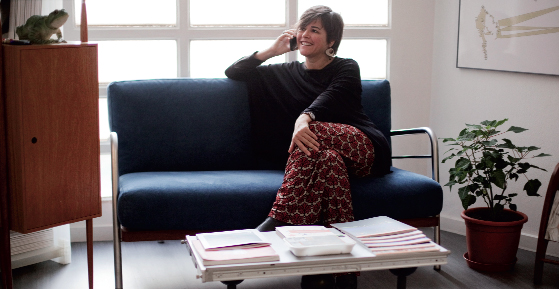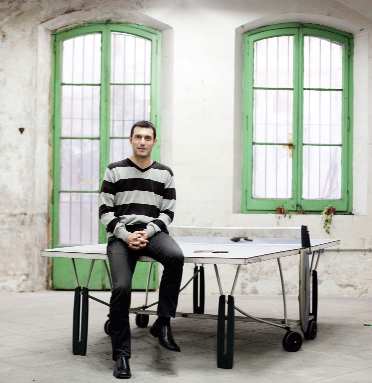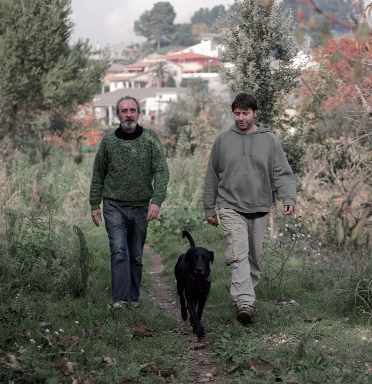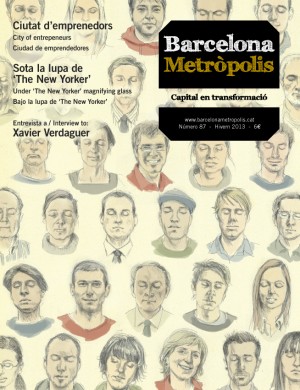The word “entrepreneur” has colonised the political and media discourse on a global level. Entrepreneurs are all the rage in the United States. In Catalonia, neither the crisis nor the employment ecosystem help them, but they try to carve out their niche in the market.
The whiteboard says “What is an entrepreneur?” The board is at the University of Brighton, in the Faculty of Medicine. It is Christmas 2010. Another whiteboard has the same word, alongside “social and economic value” and “digital culture”. It is June 2012. The whiteboard is in an office in one of Oxford’s colleges with eight centuries of history. In the Faculty of Communication at the UAB in Bellaterra, Barcelona, a teacher has left his mark in a classroom. “Entrepreneur”, says the sheet. It is November 2012. Why has there been a global boom in entrepreneurs? “Out of necessity,” explains Alfred Vernis, lecturer in the Department of Strategy and General Management at ESADE. Vernis makes it quite clear that entrepreneurs have always existed, but now, the political discourse, both local and European, keeps repeating the “need for entrepreneurs” to pull us out of the economic crisis.
Last November, even the Spanish royal family used this argument in a public speech. While talking to a group of businessmen in Navarre, Prince Philip of Asturias asserted that the future “of Spain” was dependent on entrepreneurs and “a society that is more flexible and more tuned into global trends”.
Who are entrepreneurs? “People who, driven by a business idea or a social need, decide to set up their own company and do so with passion and a spirit of discovery,” explains Vernis. “With the advent of the economic crisis, many people with a professional career are choosing to start their own business. Projects must be conceived as global or must fill a very specific niche. Trying to be an entrepreneur in our country and thinking only about this country is tantamount to committing suicide.”
There is no data on how many entrepreneurs there are in Barcelona. Neither are there studies on how many companies created in the second decade of the 21st century will have an economic performance that will guarantee their survival. Many entrepreneurs are still looked upon as being on the fringes of the economy – they invest in projects based on the experience of their former, often successful careers, which helps them to understand the market, work in other business ecosystems and have international contacts, while relying on an economic cushion that gives them some time to think and start up their own initiatives.
Things are not easy for them in Catalonia or in Spain. Vernis explains that in this country, “the ecosystem surrounding entrepreneurship” is not as favourable as it is in other places. “We are short on investors willing to spend money on new ideas,” he reflects.
In the Unites States, enterprising companies are becoming new successful business models and the so-called business angels support young people fresh out of university who bring new ideas to the market as well as changing the operational status quo.
One of the most successful examples is Airbnb, for renting houses among travellers. The company is four years old and was started up in Silicon Valley when its creators, then students, decided to rent out their house to make some extra money. It now has a network of rental homes in 126,000 cities in 192 countries and has been listed since last year. Airbnb already has five offices in Spain and grew by 700% last year.
Airbnb sums up the characteristics that an entrepreneurial business has to have to make it in the global market: it covers a niche in the market which the Government neither deals with nor recognises; its creators promoted it with a fighting spirit (they call it the exchange economy); it saw the light as a global initiative, i.e. targeting the world class (educated English-speaking citizens of the world); and it is nurtured by digital culture – it is run and promoted over the internet, making it possible to check user profiles (through Twitter, Facebook and LinkedIn) and thus increase levels of trust among users.
Companies such as Airbnb or Couchsurfing, which this year has received an injection of fifteen million dollars, have opened up a debate on the role the state should play in the face of these initiatives and to what extent they are a threat to the power lobbies. Alfred Vernis argues that the state “should intervene as little as possible with regards creating companies and as much as possible with regards tax regulation; in other words the State has to be able to generate taxes in order to redistribute them. Otherwise we may end up at the other extreme. Other monopolies, such as Google for example, are already emerging.”
MOB, an interdisciplinary and collaborative space
Zero architectural barriers. The entrance is at street level and it has its own cycle park. From the door we can see large windows, desks and people at their laptops. We punch in the code and enter MOB, which stands for Makers of Barcelona, a co-working space in the heart of the Eixample district. It opened less than a year ago and already has a community of eighty entrepreneurs who come to the space to work on their own projects, and where they can collaborate with other projects being managed or developed here.
The space was opened by the Chinese-American architect, Cecilia Tham, who studied at Harvard University and came to Barcelona in 2001 and who, for ten years, tried to create a community through digital platforms. Her goal was to continue to “experience the sense of community” she had felt in Harvard. It was impossible – there had to be a physical space for a community to exist.
This is why she opened MOB – a multidisciplinary, transgenerational, international space open to reflection and community debate. Tham also has no doubts that this way of working – more horizontal and involving trust networks – is still very new in Catalonia. “Here there exists a protective instinct which means that you don’t trust someone until you know them very well. Moreover, it’s neither easy nor cheap to be self-employed in Catalonia.” The large banks, the elite business schools and the Government itself have taken an interest in entrepreneurs and have created schemes to aid or fund their projects. But more investors who believe in these new companies are still needed, and many entrepreneurs turn to the international market in search of support.
All the questions which arise out of adoptions

© Italo Rondinella
Eva Gispert, founder of the Family and Adoption Institute, was able to launch her project thanks to the support of the Catalan Regional Government and the municipal agency Barcelona Activa.
The IFA (Family and Adoption Institute), established and run by Eva Gispert, employs twelve professionals, in Barcelona, Girona and Seville.
She goes silent. Eva Gispert is a torrent of words, but when asked if she would define herself as a social entrepreneur, she pauses. “I’m beginning to believe that I am.” Gispert, a law graduate, formerly worked for ESADE, where she was the Managing Director of a gender project for the European Commission, and it could be said that her life was nothing if not successful. Three years ago, a job she had never felt involved in came to an end and she told herself that it was time to “rev up” her own project – a support and growth centre for adoptive families and adopted children to answer all the questions that come up in the course of adoptions.
She knew what she was talking about, and above all realised that finding the answers would be a long and difficult road with some wrong turns. Gispert is an adopted child and an adoptive mother herself. Two years later this project is called the Institut Familia i Adopció (IFA; Family and Adoption Institute), she has an office and twelve professionals working for her and operates in Barcelona, Girona and Seville.
Gispert says that the IFA was born of a personal concern and quest. For many years she tried to understand what she calls the two Evas. One was the successful Eva, the hyperactive and brilliant teenager, the adult executive who accomplished all her goals and had even given her testimonial as an adopted daughter in a book. The other was the Eva who, from the age of fifteen, was sometimes overcome by sadness for no reason at all. “I had a good job, a husband who loves me and three children, the youngest one adopted.”
The search for the answers to this sadness was a long one. At the age of thirty-two she tried psychological therapy which did not work because “the professional was not a specialist in adoptions”. She was recommended a psychiatrist, but sensed that this was not the way forward either. She eventually found a psychologist “specialised in bonds and abandonment” who helped her to understand the source of this grief.
At the same time she did a Master’s in family mediation in which she began to learn how a person is formed, and then did another Master’s, in therapeutic theatre, which brought her into contact with herself and with other techniques she had hitherto been unaware of. In this search, she also learned that adoption was dealt with differently in the United States and Sweden: “They are much more advanced.” Eva Gispert realized that, over thirty years, she had had to knock on many doors to get a few uncoordinated answers, and that moreover many adoptive families and many adopted children are forced to trudge along the same tiring road. “When my testimonial was published in the book, a lot of people approached me and told me that they had felt and experienced the same thing.” So she decided to create IFA.
First of all she structured her ideas. Affording consistency to a project was something she had done many times for others, at ESADE and the European Commission, but applying this to herself was quite a challenge. She presented her project to the Government and the answer was, “It’s very good,” followed immediately by, “There are cutbacks.” That did not deter her. She applied for a grant offered to social entrepreneurs by the Catalan Government. Fifteen of the two hundred projects submitted were selected. IFA was beginning to take shape. Thanks to the grant, she received assessment from Barcelona Activa and two years on she says that the result is “very positive”.
For a more democratic and a horizontal economy

© Italo Rondinella
Albert Cañigueral champions the collaborative economy system inspired by the theories of Bostman, describing the professionals aligned with the movement as “radical entrepreneurs”.
Albert Cañigueral is the creator of the Collaborative Consumption blog and a facilitator in Barcelona of OuiShare, a European movement linking together collaborative economy entrepreneurs.
He turns up with a backpack on his shoulder that weighs about the same as a laptop. He is in the bar of the Centre of Contemporary Culture of Barcelona (CCCB) because he is one of some thirty people, aged between twenty-five and forty-five, who have been invited by a US consultancy firm with offices in Barcelona that organises interdisciplinary world class evenings to provide networking for entrepreneurs with innovative ideas or up-and-coming businesses. There are people from Holland, Turkey, the USA and Catalonia.
Albert Cañigueral worked for a Taiwanese multinational for two years. Less than a year ago he returned and chose to give up his promising career as a multimedia engineer to become an entrepreneur.
What made Albert Cañigueral leave behind his shirt and tie and a respectable office job? In actual fact there is nothing remarkable about the way it all happened. One day he stopped and looked around him: “I realised that we were like hamsters. People worked hard only to spend their money in shopping malls. I suppose that being in another country gave me the chance to take a step back and think. The digital world has shown us that scarcity doesn’t exist.” At the time he was reading a book, What’s Mine is Yours, by Raquel Bostman, and also had the feeling that something was wrong in this society with a socio-economic model which to him did not seem to make people more creative – as Adam Smith would say – or wiser, and certainly not happier.
Time magazine believes that “sharing and collaborating”, Bostman’s core argument, will be one of the ten ideas that will change the world. For the moment, Bostman has made her mark on a generation of young people who, after studying degrees in economics or engineering, having been through business school and worked in multinationals at home and abroad, now seek other business models and, more particularly, other ways of living.
They sum it up in a concept: collaborative consumption, i.e. a more democratic and horizontal economy that optimises consumption and uses ICT to create connections and global actions. Cañigueral explains that for him, collaborative consumption is a system based on redistribution (eBay or Nolotiro), access and not ownership (Bicing is one example), and a cooperative life, such as time banks, couchsurfing (opening your home to travellers who need a bed) or Airbnb, house rental among travellers.
Cañigueral is fully convinced that the new system is a social innovation in all regards, from education to economics and the way people relate to each other. Even so, he says he does not know how to handle the social entrepreneur label: “Maybe I prefer the radical entrepreneur label, because our aim is to change this system.” For the moment, besides his blog, he manages the French-born European Movement OuiShare from Barcelona, which brings together entrepreneurs and people from many different fields at interdisciplinary meetings in Barcelona, Rome, Berlin or Paris, where they share experiences and start up transnational projects thanks to digital culture.
“Today I help you and tomorrow someone will help me”

© Italo Rondinella
Cristóbal Gracia, one of the three founders of Favorece, is adamant that he belongs to a generation which has not bought into a model based on competition and antagonism.
Cristóbal Gracia is one of the founders of Favorece, a start-up which has created a virtual platform on which to offer and request favours.
His website has two categories – those who ask for something and those who offer something. Sometimes the person asking is also offering and vice versa. The range of favours is very diverse – someone offers fruit to make jam, someone else needs furniture or needs someone who knows how to cut their dog’s nails.
There is no money or trading involved. The logic is indirect reciprocity or what Cristóbal Gracia, one of its creators, defines with this phrase: “Today I help you and tomorrow someone will help me.”
Favorece is one of the first favour websites in Spain. For months now they have been working with programmers from Yale University to develop the software, while Cristóbal Gracia, Albert Martínez and Rafa Andrade, the three creators, are doing the promotional work from Barcelona.
I interview Cristóbal Gracia outside, on a bench facing San Sebastià beach. For years no interviewee had requested to use a piece of urban furniture as a meeting place, but this entrepreneur did so with the utmost nonchalance.
Competing is not an option
Gracia knows full well that he is part of a generation that has not bought into a model based “on competition and struggling”. “Competing isn’t the best option for human beings; it doesn’t yield the greatest benefits.”
Favorece is the outcome of a personal quest and the embodiment of the clash between two socio-economic models that coexist and which Gracia has been party to. He defines the project as a start-up because, he says, “it creates a service in conditions of extreme uncertainty”.
His résumé includes a degree in Economics, working in a Spanish company, travelling, near-native level English, a job in a multinational, and later, the need for something different. “I always knew that I didn’t fit in at the multinational, so I saved up and when my contract ended I went travelling. There came a moment when I didn’t know what I wanted anymore.”
A Master’s in personal growth from the University of Barcelona gave him some clues as to what this other stage in his life might be – doing something to change society and start up a project which in some way would connect him to values that he had learned at home and could not find in the business world, but which he nevertheless shared with other entrepreneurs whom he had linked up with via OuiShare.
“We are rediscovering business models through collaboration. What I mean is that things are being done in an increasingly more sustainable, efficient and collaborative fashion.” For now, like most start-ups that are flourishing in Barcelona, Gracia cannot yet pay the rent, but he understands that creating a social business is not at odds with it being profitable.
“Everything is still very new,” he says. Almost unexpectedly, he has been asked to give talks about this new social paradigm in civic centres, schools and other organisations.
A meeting point in the field

© Italo Rondinella
David Bori, on the right of the photo, cultivating the allotment in Sant Esteve Sesrovires together with the owner of the land, Yamandú Sabini, on the left.
Santiago Cuerda set up the shared allotment venture Huertos Compartidos a little over a year ago. One of the allotments is already in operation in Sant Esteve Sesrovires. It is worked by David Bori; the owner of the land, Yamandú Sabini, is also a grower.
Huertos Compartidos was conceived the day that Santiago Cuerda read in a blog that a UK organization, Landshare, put land owners and people who wanted to grow crops but did not own any land in contact with each other. This initiative had recovered 1,200 hectares of empty land and more than 70,000 people were taking part in the project. Santiago Cuerda launched a similar project through the NGO Reforesta – of which he is co-founder and secretary – and in the first eleven months alone the website (www.huertoscompartidos.es) was visited by 60,000 people, 500 of whom are registered. Moreover, almost unintentionally, he has become a social entrepreneur. In June, the association Cibervoluntari@s honoured him with the 2012 Empodera award for the most innovative initiative, and he is now participating in the Socialnest 2012 project.
He lives in Cuenca. Over the phone, Santiago Cuerda told us that he is “learning to apply a social business approach” to what was initially an initiative driven by “personal integrity”. He is honest. He was unemployed and launched a project which in actual fact was the result of his career as an environmental activist, although he did not expect such an impact, and neither does he believe that the project is finished yet. “It’s a work in progress,” he laughs, because he keeps adapting the website “in response to technical problems and queries raised by users”.
The mechanics for sharing a garden “are simple” – land owners and farmers register on the website, enter their phone number and give a description of the land or their needs. If the gardener and the land owner live in the same area and they reach an agreement, they sign a contract according to which “production will be ecological, the land will be leased free of charge and the harvest has to be shared, i.e. for their own consumption”.
Demands generated by big cities
At the moment, explains Cuerda, there are more people wanting to farm (384 registered gardeners) than land owners (132) offering land. In addition, he says, most of the land is located in isolated rural areas and the demands of future gardeners come from the big cities. “As yet, there aren’t many gardens actually operating,” says regretfully.
In Barcelona there are 59 future gardeners and 10 land owners registered. One of the shared gardens already up and running is located in Sant Esteve Sesrovires. Yamandú Sabini searched the internet to see if anybody wanted to cultivate part of his land, simply because he had neither the time nor the energy to do it himself, and he found the Huertos Compartidos site.
On the same site David Bori found the description of Yamandú’s plot – 800 metres of land, fruit trees, almond trees and even olive trees. Now they are both preparing the soil for seeding as they get to know each other.




